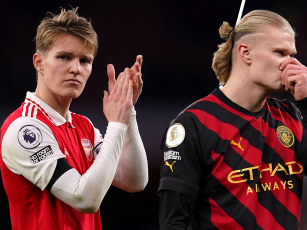As I sat slumped in my seat at the Aviva Stadium at 9:34pm on Tuesday, November 14th 2017, I felt like a complete dope.
A dope for being optimistic, a dope for believing we would qualify for the World Cup and most of all, a dope for celebrating the draw.
When the ball was uncorked on October 17th and Denmark was revealed as the opponents for the World Cup play-off, I leapt from my chair and let out a celebratory cheer as if we’d won the game.
What a dope.
Something sporty just happened... Know how I know? The entire @offtheball squad just screamed the building down...
— Jess Kelly 👩ðŸ»ðŸ’» (@jesskellynt) October 17, 2017
The optimism wasn’t all drawn from the heart, a good chunk came from the head. Ireland were well organised and competitive in Copenhagen, they have a history of producing on big occasions.
Wins over Germany, Italy and Wales in Martin O’Neill’s reign prove that. Backing the Boys in Green was not a sentimental call on this occasion, it was a measured conclusion based on big game performances.
That’s why the heavy defeat is so hard to process, how and why did it happen? No defensive shape, costly individual errors, ill timed and poorly thought out substitutions and a lack of leaders on the pitch.
The feeling of disappointment will linger for a long time, but rash decisions shouldn’t be made. The blame has been laid at the door of the manager Martin O’Neill but he should not pay the price for Ireland's current plight.
Like or loathe the Derry man and his tactics, it is undeniable that O’Neill has done a good job. He led Ireland to the 2016 European Championships, where they reached the knockout stage after beating Italy.
They were on the cusp of ending a 15 year wait to return to the World Cup after finishing second in their World Cup group behind winners Serbia.
A creditable achievement as Ireland were fourth seeds in one of the toughest European groups in qualifying.
When the knives came out on Tuesday, O’Neill could point to his record when the time came for damage control. As bad as it was, it was still just a fourth defeat in his 24 competitive game in the dugout.
As demoralising as the loss was, as gut wrenching as the manner of the humiliation became, it should not precipitate a change in management. O’Neill has been quick to point out that he makes the most out of a group of players well aware of their limitations.
He has used that excuse to shield himself from criticism of some results and the style of play in the past, but that doesn’t mean the point he makes isn’t a valid one. The players at his disposal are limited and sober reflection will likely show that O'Neill has perhaps overachieved.
The Derry man has agreed a new deal, and it appears improbable that either the FAI or O'Neill will fail to honour their word. The manager will stay but faces a significant process in rebuilding the squad. Seven players who played in the play-off tie are over 30 years of age.
Wes Hoolahan (35), Daryl Murphy (34), and Glenn Whelan (33) could be considering their international futures at present.
What younger players do we have waiting in the wings that would be ready for the step up to international level? Would any of them have made a better fist of Tuesday? Perhaps the most demoralising aspect of that brutal defeat is that it will likely get worse before it gets better.
The present for Ireland is tense, the future, sadly is imperfect.








